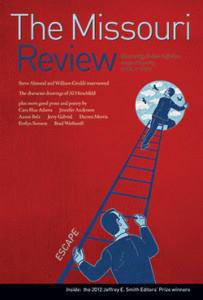Upon finishing an MFA, you’re surprised to discover that exactly what you thought would happen, actually does. It’s anticlimactic the same way that, at the end of this week, your teaching semester will end. Students will fall away to summer vacation, grades will post, and life will yawn out before you.
In Fiction Workshop, regarding a story set in a coin-operated porn booth, you say, “I’m sorry to ask this, but what is the climax in this piece?” After a few labored giggles, a student ventures a guess: “Is it when the main character flashes back to when his daughter was hit by a car?” and you discuss if a climax can happen in a flashback, and what does it mean for the story if it does? You don’t know what else to do but to care deeply–almost too deeply–about this.
After class, you and Sam feed the ducks bread that’s not yet stale, bread you could’ve turned into a peanut butter and jelly, but you  like the stretchy afternoons when you and your three-year-old dawdle down to the path of the Erie Canal and throw balled-up white bread at aggressive mallards. The two of you analyze the knobs of their heads for brown, looking for the mama ducks, but their babies haven’t hatched yet, so they’re at the nest, you tell Sam. Only the dads swim up.
like the stretchy afternoons when you and your three-year-old dawdle down to the path of the Erie Canal and throw balled-up white bread at aggressive mallards. The two of you analyze the knobs of their heads for brown, looking for the mama ducks, but their babies haven’t hatched yet, so they’re at the nest, you tell Sam. Only the dads swim up.
Confess to your husband that, yes, you always suggest walking to the canal, and Sam’s always game for it, but once you near the bridge, which you know Sam takes entirely too long to cross (a childhood fear that you hope you conceal), you find yourself pulling him along, telling him, Come on, or You can’t stop in a cross walk, or Look in the same direction you’re moving, but inside, you completely understand how a person can be tied to what’s behind them.
Some of your students had been okay with a climax in flashback, but you were not. Then why not just tell the story of what happened in the flashback? you asked. Put more focus on the present scene, you said, sounding a lot like your MFA advisors.
Sammy doesn’t pull you ahead the way Johnny does. Instead, you find yourself acting the part of child or the poor-mannered mutt. Why are you so eager to get a move on? There is no deadline. Your stories have been edited to the brim and wait for you to forget them so you can read them again and pick them apart like a vulture.
You and Sam sit on the stoop of Java Junction, a spot he’s chosen because there’s an ample pile of bird food surrounding the small tree just in front of the coffee shop and a legitimate aviary in its branches. Sam is happy to sit, watching the birds, so you humor him, taking a picture of him with your iPhone and watching the same car pass three times, its driver having completed a list of errands you no longer have.
Sammy loves birds. He knows the names of more birds than you do. In fact, this is true for all animals. When Sammy is in the bath, and you say, “If you dump that whale-ful of water out of the tub one more time…” he responds with, “Mom, it’s not a whale.”
You coerce him to leave the birds by promising to draw pictures of birds when you get home, but after dinner, when Johnny has come off the bus, and you have fed the boys cheese pizza, and then have promised to play outside, you will not have drawn a picture of a bird. Tomorrow, you think.
At 7, it’s nearly dusk, and you open and close the issue of The Writer that you’ve dog-eared on “Going Postal: A new book helps writers achieve success after an MFA” while trying to drink a coffee in the warm and fleeting spring sun amidst Sam, who is slow-going to understand the logistics of bike pedals, and John, who bikes dangerous circles around your house, so you give up. You crawl on all fours behind Sammy, who lets you cycle his legs until he gets the rhythm of the pedals, leaving your magazine on the porch to blow open in the wind you wish would go away.
The teenager next door, a sensitive thirteen year-old you only hope will stick close to your boys, calls the three of you over and points at what he thinks, at first, is a dead worm on the driveway. It’s too big to be a worm, he realizes.
“I think that’s its heart,” the teenager says.
“It looks scientific,” John says.
You and the teenager agree: it’s a baby bird.
When the three boys bury the bird, you help. You remember burying a bird you found in your childhood backyard not even a block away, and how you wrote about it years later.
Before the burial, Sam had reached slowly for the smushed bird, and you stopped him. He wasn’t sad, as you’d feared. It was a beautiful and gross thing–the colors like acrylics on the black pavement. And by the time you’d finish staring at it, Sam had given it a name.
 “You Hear Night Sounds,” my short fiction, has been published at The Rumpus. This piece is inspired by serial killer Joel Rifkin, who attended SUNY Brockport in the seventies.
“You Hear Night Sounds,” my short fiction, has been published at The Rumpus. This piece is inspired by serial killer Joel Rifkin, who attended SUNY Brockport in the seventies.









